SPECIAL REPORT: Illegal miners degrade Ekiti community, engage in child labour
The activities of illegal miners in a community in Ekiti State have caused degradation of the environment, as miners engage the services of children in carrying out their illegal acts while the government turns a blind eye. Abdulwasiu Olokooba reports
It was a sunny Tuesday afternoon at Ijero community in Ijero Local Government area of Ekiti State. Although the sun was biting hard, it did not deter the illegal miners who were busy drilling and mining limestone, columbite, tourmaline stone, gold, and other mineral deposits at the site.
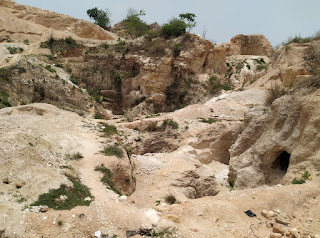
The mining site in Ijero-Ekiti / Credit: Abdulwasiu Olokooba
Heaps of gravel surround the mining site. The stones are first excavated before reaching the muddy earth from which the minerals are extracted. The miners have no use for the gravel stones – which is another source of huge revenue; they are only after the precious stones.
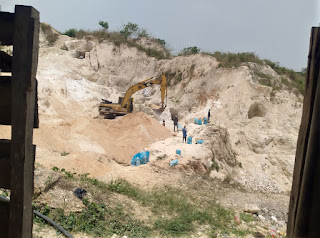
Miners captured excavating the soil at Ijero|| Credit: Abdulwasiu Olokooba
They work in groups. Some of them excavate the earth under the soil, separating gravel and other unwanted substances from the soil. The labourers, who sieve, carefully ensure the yellowish muddy stones find their way into the sacks they were holding where the mineral is further extracted from dirt.
This reporter visited this mining site under the guise of a researcher. An artisan helped him to access the site. The artisan, who craved anonymity, said he engages in illegal mining to make a living after several years of job hunting. For the purpose of the report, he will be referred to as John.
John was seen picking minerals in one of the trenches in the site when this reporter arrived there. Immediately he sighted this reporter from afar, he directed him to wait under a shade, which was later identified as the miners’ office. He attended to this reporter some minutes later.
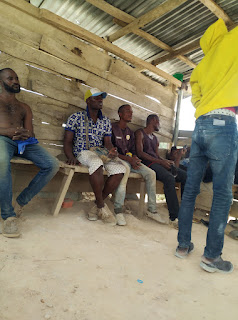
The artisanal miners resting at their office in Igemo, Ijero-Ekiti|| Credit: Abdulwasiu Olokooba
“Ordinarily, we don’t entertain strangers here, but because you are doing research, the chairman may listen to you,” John said when this reporter declared his intention.
The chairman, who appears to be in his late 30’s, said he would have asked this reporter to bring a letter from the school that sent him to do the research.
“But since you said your school is on strike, no problem,” he later said. “These people (artisans) you see working here are partnering with a company. They are paid depending on what they deliver.”
While he told this reporter that the name of the company is Abbay Mineral Resources, he refused to tell this reporter whether the company has a subsisting mining licence, saying “you can’t know that one” while raising his voice.
Checks on the Federal Ministry of Mines and Steel Development’s official website showed that a small-scale mining lease given to one AbbyDad Entreprises on April 16, 2015 to exploit gemstone and other mineral resources in Ijero has since expired on April 15, 2020 — two years back.
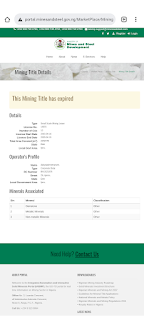
Screenshot of AbbayDad’s mineral title status as revealed by Ministry of Mines’ website
Any holder of the small-scale mining lease like AbbyDad Enterprises has the exclusive right to carry out small-scale mining operations within a mining area greater than five acres but less than three kilometre square for a period of five years initial period, but it is renewable for another five years.
Efforts to confirm if Abbay Mineral Resources mentioned by the chairman and AbbyDad Enterprise found on the government website with the incorporation number (RC – 2021078) refer to the same entity were unsuccessful. Contact details such as phone number and email address of AbbyDad Enterprise were not publicly provided by the Corporate Affairs Commission (CAC) which stated that the company was incorporated on December 4, 2006.
Similarly, there was no physical presence of the company at the address indicated on the CAC portal.
And when contacted, the district head of Okelogbo, Obalogbo of Okelogbo said: “I don’t know of any mining company in Okelogbo.”
However one of the miners who claimed to have been working at the site for more than five years told this reporter that both names refer to the same company. But this reporter could not independently verify this.
“It is still the same company. We have only one Abby company in the mining business at Ijero. The person that told you it is Abby Mineral Resources might be wrong because most of us (the artisans working for the company) don’t know the full name of the company. We just know it is called Abby. Our main concern is to go there, work and get paid,” he added.
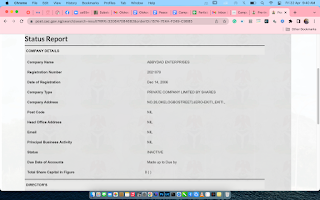
AbbayDad Enterprises’ details as supplied by CAC
The chairman, however, told this reporter that the company still pays royalties accruing to the government. “Our major challenge has been the federal government. The government is supposed to render little assistance which they did not despite paying our loyalties to them at the end of every year,” he claimed without stating how much is being paid as royalty.
Cadastre Office demands N75,000 to release information on mineral title
To get credible information that would corroborate previous findings on AbbyDad Entreprises’s mineral title, this reporter contacted the Nigeria Mining Cadastre Office, an autonomous body empowered by The Mining and Minerals Act (2007) to administer mining titles in Nigeria..
But when told about this reporter’s mission, a woman who spoke at the other end of the phone said, “in our place here, what you are saying is called due diligence search.”
Read also: SPECIAL REPORT: Inside the illegal trading of forest woods in Cross River community
She continued: “We don’t just give you information because you are not a member of the company; you are a journalist. So, if you want any information on that company, you need to pay N75,000 to the government’s account and write a letter.”
Reacting to the Cadastre Office’s demand, Mr Olamide Jacob, a public affair analyst, described the request as ridiculous and unfair to public interest.
“How will the institution be charging that huge amount of money to discharge their statutory duty? I think the whole essence of this demand is to dissuade people from investigating illegal miners, and this is another reason I will say Nigeria is not ready to solve this problem.
“It is so pathetic that our bureaucratic system is aiding many people to continue stealing our natural resources unlawfully,” Mr Jacob added.
Environmental degradation, deforestation take over Ijero-Ekiti
As a result of these unregulated mining activities, the extent of environmental degradation in Ijero-Ekiti is unimaginable. For a stranger, it is advisable to follow the foot track on the ground, otherwise, a wrong step could lead to death. This is due to the haphazard nature of the mining activities carried out there over the years.
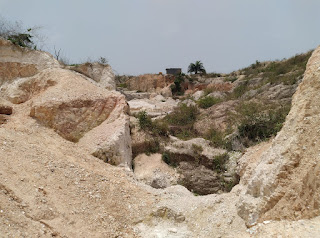
Impact of mining activities in Ijero-Ekiti|| Credit: Abdulwasiu Olokooba
“If you want to walk through, you should watch your way so that you don’t fall into a hole. Those grounds you are seeing on this site have been connectedly dug from one side to another by the miners,” John warned this reporter while granting permission to move around the mining site. “If you are not careful, you would find yourself in one of the trenches.”
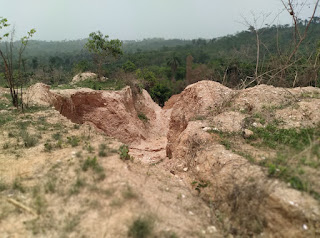
Impact of mining activities in Ijero-Ekiti|| Credit: Abdulwasiu Olokooba
It is not only the land that suffers degradation at the mining site in Ijero, the forest also is not safe. Anytime the miners realise there is no more available land to exploit, they resort to clearing nearby forest. “This place was a forest before; we keep clearing and cutting the trees to mine the land,” John disclosed.
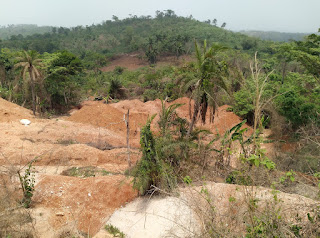
Deforestation takes over Ijero-Ekiti|| Credit: Abdulwasiu Olokooba
Poverty fuels child labour at the mining site
Soft-spoken 15-year-old Sunday (full name withheld) was seen struggling to make a living for himself alongside his 37-year-old mother at a mining site.
According to the principles contained in the Child’s Rights Act enacted in Nigeria in 2003 (a legislation already domesticated in Ekiti State), a child of Sunday’s age should be within the four walls of a classroom, not at a mining site, but due to his poor background, there was little or nothing he could do about his situation.
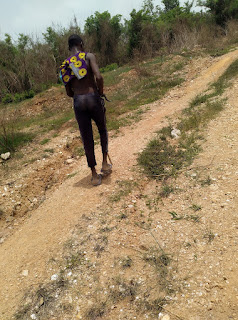
15-year-old Sunday at the mining site|| Credit: Abdulwasiu Olokooba
“My mum was the one that brought me here. She convinced me to follow her to work to get money that we can use the money to eat and probably save for my school fees.
“But this job is not easy. I get tired easily. If I have the option, I won’t follow her tomorrow,” he said as his voice reflected his depleted strength.
When this reporter spoke to his mother, who simply identified herself as Ruth, she said working at the site is not only exacting but also the pay is not in any way commensurate with the labour.
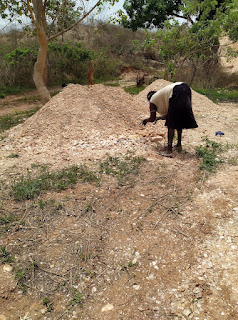
Ruth working at the mining site|| Credit: Abdulwasiu Olokooba
“My son did not lie. This work is not easy, even for me as a mother. Our daily income is not certain; it depends on what the miners deliver.
“I asked him (Sunday) to come and work so that we can get more pay to sustain ourselves. I know today is Tuesday, and he is supposed to be at school with his mates.
“But when I don’t have money to give him, there is no other option than to bring him with me to the site,” Ruth said.
Sunday’s story is similar to that of thousands of children in Nigeria who engage in unlawful labour in their quest for survival.
The United Nations Children’s Fund (UNICEF) reported that at least 10.5 million children are out of school in Nigeria, which is the highest rate in the world. This estimate means that about a third of children in the country are not in school and a fifth of out-of-school children worldwide are Nigerians.
Peter Hawkins, UNICEF Representative in Nigeria, stated in January: “Millions of Nigerian children have never set foot in a classroom – and this is a travesty. Perhaps equally tragic is the high number of children who make it into a classroom, but never make the transition from primary school to secondary school – thereby cutting off their chances for a secure future.”
The high rate of out-of-school children in the country negates the main objective of the country and the state’s Child Rights Act, which makes it the duty of the government to provide free, compulsory, and universal basic education.
In 2003, Nigeria enacted the Child’s Rights Act as a party to both the United Nations (UN) Convention on the Rights of Child and the African Charter on the Rights and Welfare of Child.
The Act guarantees children fundamental rights to education, development, movement (subject to parental control) as well as protection against all forms of inhumane treatment. It also mandates authorities to put in place policies and programmes for the development and survival of every child.
Section 28 of the Act prohibits exploitative labour of children, stating that “no child shall be subjected to any forced or exploitative labour; or employed to work in any capacity except where he is employed by a member of his family on light work of an agricultural, horticultural or domestic character.” People who violate this provision may be fined and/or imprisoned for up to five years.
David’s bitter tale
But David (not real name), another teenage labourer who spoke to this reporter, started working at the mining site when he was 16 years old to support his mother, a banker who was struggling after being sacked unexpectedly by her employer.
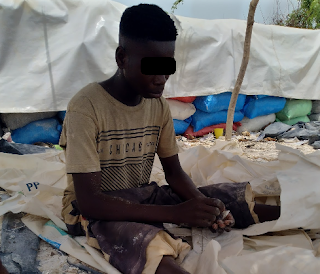
David narrating his ordeals as a labourer at the mining site || Credit: Abdulwasiu Olokooba
“Things were very difficult for us after my mother lost her job. Several times, I would not go to school because of money. So, I decided to come to this site to work,” he said. “As a child, I know this kind of work is hard for me. But that is the only way I could help my mother.”
“And I really want to go back to school if I get the opportunity again because my biggest dream is to be an engineer,” David added.
‘A gross violation of Child Rights Act’
A Child Rights advocate, Mr Taoheed Adegbite, has described the engagement of children in hard labour, like working at a mining site, as a gross violation of the Child Rights Act.
He said it is the parents’ responsibility to make sure every child is put in his best care, which according to him has to do with education and other basic responsibilities.
“It is totally wrong for a child to engage in hard labour before he could get some Naira to continue school.
“Government should buckle down to ensure that education is holistically free so that every child would be in class regardless of social class,” he advised.
Previous studies and reports have linked crimes and atrocities like this to poverty. Just like in Sunday and David’s cases, poverty deprives children of schooling and acquiring human skill.
Poverty in Nigeria
The World Bank Commission on Global Poverty defined extreme poverty as those living below the international poverty line of $1.90 per day. The international poverty line is the universal standard for measuring global poverty. It helps to measure the number of people living in extreme poverty while comparing poverty levels between countries.
As of 2022, 91 million Nigerians live below the poverty line, a report by the Nigerian Economic Summit Group (NESG), at the launch of the Macro-Economic Outlook of the Group in Abuja, revealed. Similarly, an analysis of a report by the Socio-Economic Rights and Accountability Project (SERAP) showed that about 27.4 million Nigerians earn less than N100,000 yearly.
Nigerians who spend less than N377 daily (or about N138,000 yearly) are considered poor, according to the National Bureau of Statistics (NBS). The above reports are reflective of the struggles of many Nigerians trying to make ends meet but, at the end of the day, still fall in the range of poverty.
Mining activities in Ijero: part of a much bigger problem
The story of mining activities in Ijero town, Ekiti State, reflects a much bigger problem in Nigeria. An estimated 80% of mining activities in the country is carried out illegally and on an artisanal basis by local populations, involving over two million people who depend on it for survival.
Despite the volume of activities on the mining fields and the increasing number of miners, the revenue from the sector has remained a paltry sum. Between January and August 2021, the Finance Minister, Zainab Ahmed, revealed that Nigeria earned only N2.44bn as minerals and mining revenue, which is less than one per cent of the N754.16bn received as oil revenue within the same period.
The Federal Government also revealed that the country loses $9bn to illegal mining annually, with the little revenue in the sector coming from the three per cent royalty paid by the few licensed miners.
Meanwhile, despite being rich in these high-valued minerals, Nigeria has not only left them in the hands of illegal miners, but also spends its limited forex to import some of the minerals.
“That is the irony of Nigeria; it imports what it has in abundance and leaves its own resources untapped,” said Dr Akinwumi Adesina, the President of the African Development Bank in February 2021.
According to him, although Nigeria has bitumen reserves worth up to $1.5 trillion, the country spends over N300 billion to import the product. Millions of dollars are spent to import 500,000 metric tonnes of bitumen for road construction annually.
Illegal and artisanal mining can also be detrimental to human and livestock health. Studies show that artisanal gold mining is capable of destroying the ecosystem. It also causes terminal diseases such as cancer, respiratory failure and untimely death of workers and residents around the mining communities.
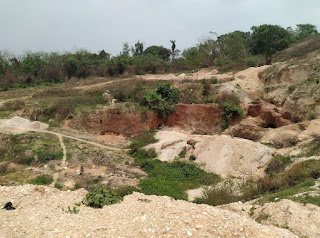
Impact of mining activities in Ijero-Ekiti|| Credit: Abdulwasiu Olokooba
A study by the Artisanal Gold Council (AGC) conducted in partnership with Global Environment Facility (GEF) in 2014 highlights some of the above dangers. It states that as long as workers engage in crude methods of gold mining and processing, especially those who solely rely on mercury for processing, they are easily exposed to acute respiratory failure.
In May 2019, the World Health Organisation (WHO) said no less than 850,690 people in Nigeria were at risk of mercury poisoning. Mercury is a chemical used by artisanal and small-scale gold miners.
The WHO noted that artisanal and small-scale gold mining is the main source of the largest release of mercury emissions around the world.
Similarly, responding to a national tragedy and historic poisoning and deaths from lead in Zamfara in 2010, the US Centre for Disease Control joined the Federal Ministry of Health and other leading global health institutions to warn against illegal and unsafe mining.
It said gold ore could produce lead, and the lead could pose a serious risk to the health of people and animals in neighbourhoods where mining takes place.
What the law says on mineral title
In a bid to regulate all aspects of exploration and exploitation of solid minerals in the country, the Nigerian government in 2007 re-enacted the Nigerian Mineral and Mining Act. The step was also aimed at fostering the growth and development of the sector.
The Act vested the ownership and control of all lands where minerals are found in commercial quantities in the government of the federation and thereby prohibited unauthorised persons from exploration or exploitation of these resources The right to explore or exploit minerals in Nigeria is evidenced by the grant of a mineral title.
According to Section 2(1) of the Act, no person shall search for or exploit mineral resources in Nigeria or divert or impound water for the purpose of mining except as provided in the Act.
Section 46(2) also provides that any person that undertakes or is involved in the search for or exploitation of mineral resources without the requisite mineral title or authority shall be guilty of an offence.
Similarly, Section 474 of the Penal Code Act proscribes fraudulent dealing with minerals in mines. It states, “Whoever takes, conceals, or otherwise disposes of, any ore of any metal or mineral in or about a mine, with intent to defraud shall be punished with imprisonment which may extend to three years or with fine or with both.”
Experts weigh in
According to a geologist, Mr Babatunde Isiaq, because of poor governance and lax monitoring, the actual figure of innocent people who die daily from toxins gotten through illegal mining, which is rampant in many parts of the country, is unknown “because there is a fear that too many citizens have been exposed, and tumors, cancers and fetal deformity could be prevalent in the future in the affected communities, like Ijero community, in Ekiti State.”
On the part of a legal practitioner, Mr Qadri Kolawole, absence of data on illegal mining gives room for a free-for-all activity without the monitoring, arrest or prosecution of perpetrators to the extent that even foreigners are involved.
“It is obvious the Federal Government is unable to control illegal mining. Let’s look at the ban it placed on it in the wake of the deaths in Zamfara State; it has proven to be a toothless policy,” Mr Kolawole said.
“We need to put control of mineral resources within the concurrent lists (the jurisdiction of both state and federal government) to develop a proper framework for the sector, particularly, artisanal mining in the country.”
Government’s response not good enough
“If you check our website, you will see what the minister has been doing regarding illegal mining,” the Press Officer Federal Ministry of Mines and Steel Development, Mrs Idowu Jokpeyibo, said while reacting to questions relating to the measures her ministry is taking to curb the menace of illegal mining activities in Nigeria.
Meanwhile, when contacted, Ekiti State Ministry of Environment Spokesperson, Mrs Folake Okeimen, promised to send the contact of the agency regulating mining activities in her ministry.
But at the time of filing this report, she did not fulfil her promise despite several reminders through calls and text messages..
This report was sponsored by I-79 Media Consults under the ‘Rewriting the Narratives of Environmental Crimes in Nigeria’ project which is supported by the Environmental Reporting Collective (ERC).



